


 |
  |
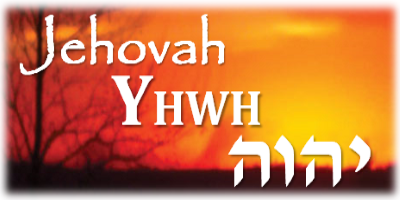 What is God's name in Hebrew?By Jeff A. Benner
If you have been searching for the “true” pronunciation of the name of God, you have probably discovered that there are many different sites providing different pronunciations. The reason for this is simple; there is no possible way to know, with 100% accuracy, how this name was originally pronounced. Let me explain.
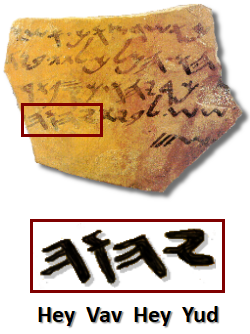
This style of Hebrew Script is called Paleo-Hebrew and was in use by the Hebrews from about 1000 B.C and into the first century A.D. Now let’s examine the pronunciation of each of these letters.
 Two Hebrew letters, the Yud and the Vav, both of which appear in this name, were frequently used as a consonant and a vowel. When the letter Yud appears at the end of a syllable it has an “I” (ee) sound. But as this letter appears at the beginning of a syllable in this name, it will use the consonantal sound “Y.” The Hey This letter, which appears twice in the name, has an “H” sound as in “hello,” but when it is at the end of a syllable it will be silent, like in the name “Judah.” The Vav In Modern Hebrew this letter is pronounced with a “V” sound as in “vote.” However, there is some debate on this among scholars and many believe that this letter originally had a “W” sound. This is one of those letters that would take a vowel sound when at the end of a syllable and would have an “O” or “U” sound. Let’s take another look at the name in the Temple Ostraca with the possible sounds for each letter. YHWH YHOH YHUH
Syllable Breaks
Y-H-WH YH-VH YH-WH
Added Vowel Sounds
Ye-He-VeH Ya-He-VaH Ya-Ha-WaH Ye-He-WeH Ya-He-WaH YaH-VaH YeH-VeH YaH-VeH YaH-WaH YeH-WeH YaH-WeH
Introduction of the Aramaic Alphabet
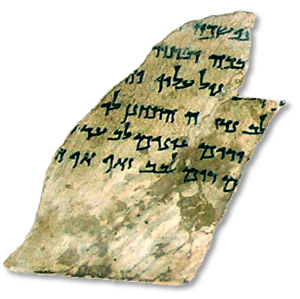 Not always, but more often than not, when they were writing with the Aramaic alphabet, they would still use the Paleo-Hebrew alphabet for the name of God, showing us that they still considered the name of God and the Paleo-Hebrew alphabet sacred. 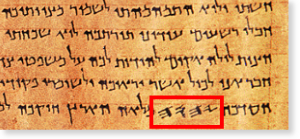
Whether Hebrew was written in Paleo-Hebrew or Aramaic, the pronunciation of Hebrew remains the same and therefore the introduction of the Aramaic alphabet has no bearing on the pronunciation of the name of God.
 And here is the same text, but with the Nikkudot added. 
As I mentioned previously, the ancient pronunciation of Hebrew may have been lost to us over time, but it can be assumed that the vowel sounds inserted into the text provide us the pronunciations of Hebrew at that time, 1000 A. D. But the question is, “Is the traditional pronunciation of 1000 A.D. the same as it was in 1000 B.C.?” Unfortunately, there is no way to answer this question.
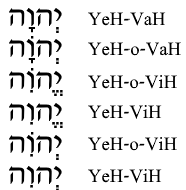
Was the name of God pronounced, these six different ways? Probably not. For over 2,000 years Jews have forbidden anyone from pronouncing the name. So, rather than placing the correct Nikkudot into the four-letter name, they placed the Nikkudot from the words אֲדֹנָי (Adonai- Lord) or אֱלֹהִים (Elohiym - God) into the four letters of the name.
Jeff & Denise Benner Ancient Hebrew Research Center If you were sent this e-mail, would you like to receive our e-mails? Go to our Mail List page to learn more! |